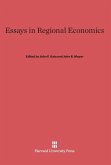In the wake of the 2008 international financial crisis, there have been intensedebates about reform of the international financial system that emphasize the needto address the problem of "overborrowing." The argument typically relies on theobservation that periods of sustained increases in borrowing are often followed by adevastating disruption in financial markets. This raises the question of why the privatesector becomes exposed to the dire consequences of financial crises and what theappropriate policy response should be to reduce the vulnerability to these episodes.Without a thorough understanding of the underlying inefficiencies that arise in thefinancial sector, it seems difficult to evaluate the merit of proposals that aim toreform the current international financial architecture.








